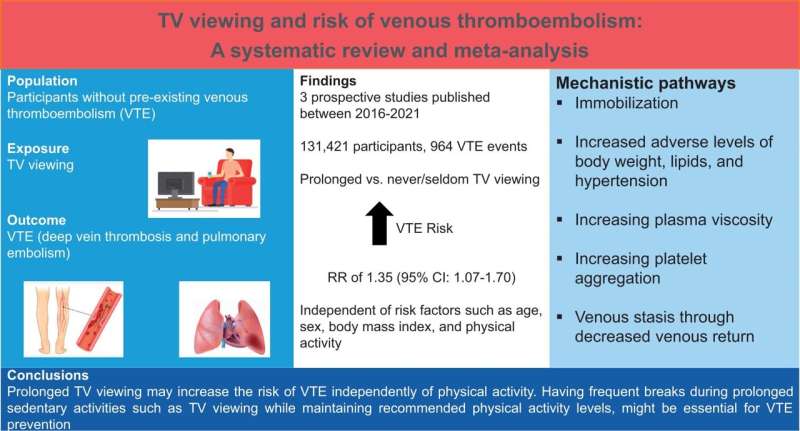TV watching linked with potentially fatal blood clots

Take breaks when binge-watching TV to avoid blood clots, say scientists. The warning comes as a study reports that watching TV for four hours a day or more is associated with a 35 percent higher risk of blood clots compared with less than 2.5 hours. The research is published today in the European Journal of Preventive Cardiology, a journal of the ESC.
"Our study findings also suggested that being physically active does not eliminate the increased risk of blood clots associated with prolonged TV watching," said lead author Dr. Setor Kunutsor of the University of Bristol, UK. "If you are going to binge on TV you need to take breaks. You can stand and stretch every 30 minutes or use a stationary bike. And avoid combining television with unhealthy snacking."
The study examined the association between TV viewing and venous thromboembolism (VTE). VTE includes pulmonary embolism (blood clot in the lungs) and deep vein thrombosis (blood clot in a deep vein, usually the legs, which can travel to the lungs and cause pulmonary embolism).
To conduct the study, the researchers conducted a systematic review to collect the available published evidence on the topic and then combined the results using a process called meta-analysis. "Combining multiple studies in a meta-analysis provides a larger sample and makes the results more precise and reliable than the findings of an individual study," explained Dr. Kunutsor.
The analysis included three studies with a total of 131,421 participants aged 40 years and older without pre-existing VTE. The amount of time spent watching TV was assessed by questionnaire and participants were categorized as prolonged viewers (watching TV at least four hours per day) and never/seldom viewers (watching TV less than 2.5 hours per day).
The average duration of follow-up in the three studies ranged from 5.1 to 19.8 years. During this period, 964 participants developed VTE. The researchers analyzed the relative risk of developing VTE in prolonged versus never/seldom TV watchers. They found that prolonged viewers were 1.35 times more likely to develop VTE compared to never/seldom viewers.
The association was independent of age, sex, body mass index (BMI) and physical activity. "All three studies adjusted for these factors since they are strongly related to the risk of VTE; for instance, older age, higher BMI and physical inactivity are linked with an increased risk of VTE," said Dr. Kunutsor. "The findings indicate that regardless of physical activity, your BMI, how old you are and your gender, watching many hours of television is a risky activity with regards to developing blood clots."
Dr. Kunutsor noted that the findings are based on observational studies and do not prove that extended TV watching causes blood clots.
Regarding the possible reasons for the observed relationship, he said: "Prolonged TV viewing involves immobilization which is a risk factor for VTE. This is why people are encouraged to move around after surgery or during a long-haul flight. In addition, when you sit in a cramped position for long periods, blood pools in your extremities rather than circulating and this can cause blood clots. Finally, binge-watchers tend to eat unhealthy snacks which may lead to obesity and high blood pressure which both raise the likelihood of blood clots."
Dr. Kunutsor concluded: "Our results suggest that we should limit the time we spend in front of the television. Long periods of TV watching should be interspersed with movement to keep the circulation going. Generally speaking, if you sit a lot in your daily life—for example your work involves sitting for hours at a computer—be sure to get up and move around from time to time."
More information: Setor K Kunutsor et al, Television viewing and venous thrombo-embolism: a systematic review and meta-analysis, European Journal of Preventive Cardiology (2021). DOI: 10.1093/eurjpc/zwab220

















